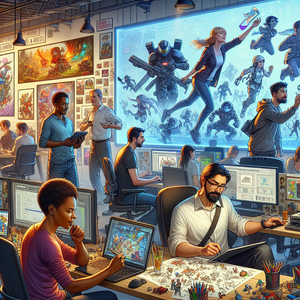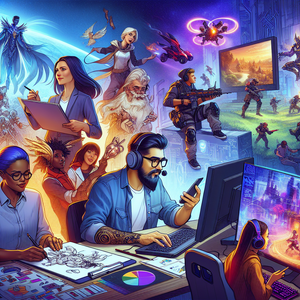
Career Paths in the Online Gaming Industry: Key Roles and Responsibilities for Aspiring Game Professionals
The online gaming industry has experienced remarkable expansion, fueled by a growing player base and technological advancements. With platforms like Poki offering a diverse array of free online games, the need for talented individuals in this field has never been greater. This booming sector encompasses a wide range of roles, each playing a crucial part in the development and enhancement of captivating gaming experiences. In this article, we will delve into the various career opportunities available in the online gaming industry, highlighting the responsibilities, skills, and significance of each role.
Job Summaries:
Game Developer:
- Game developers are fundamental to the gaming experience.
- Responsible for the coding that brings games to life on platforms like Poki.
- Typically work with programming languages such as C++ and Python.
- Work alongside powerful game development engines like Unity and Unreal Engine.
- Collaboration with artists and designers ensures that gameplay mechanics are both engaging and intuitive.
- A bachelor’s degree in computer science or a related discipline is often required.
- A solid portfolio showcasing previous projects is important.
- The quality of games hinges on developers' work, directly influencing user satisfaction and retention.
Game Designer:
- Game designers concentrate on the creative elements of game development.
- They craft gameplay mechanics, narratives, characters, and immersive environments.
- They conduct market research to understand player preferences and trends.
- Designers use this information to design captivating experiences.
- Proficiency in design software like Adobe Creative Suite is essential.
- Storytelling and problem-solving skills are important.
- A background in game design or interactive media can be advantageous.
- Designers play a pivotal role in creating enjoyable experiences for players.
User Experience (UX) Researcher:
- UX researchers play a critical role in decoding how players interact with games.
- They conduct studies, surveys, and usability tests to gather data on player behavior, which informs design decisions.
- A degree in psychology, human-computer interaction, or a related area is typically necessary.
- Strong analytical skills and familiarity with research methodologies are important.
- By prioritizing player experience, UX researchers contribute to enhanced game design, leading to greater player engagement and satisfaction.
Community Manager:
- Community managers serve as the essential bridge between game developers and players, nurturing a vibrant gaming community.
- They oversee social media channels, respond to player feedback, and create content to keep the community informed and excited.
- Strong communication skills and an understanding of gaming culture are vital.
- Experience in community engagement and marketing can be advantageous.
- Community managers significantly influence player loyalty and the overall environment, which can be a determining factor in a gaming platform’s success.
Game Marketing Specialist:
- Game marketing specialists are tasked with promoting games to ensure they reach a broad audience.
- They formulate and implement marketing strategies.
- Conduct market research.
- Collaborate with influencers to boost visibility.
- A background in marketing or business is essential.
- Strong analytical and creative skills are essential.
- This role is crucial for driving traffic to gaming sites like Poki.
- Effective marketing can substantially impact player acquisition and retention.
Quality Assurance (QA) Tester:
- QA testers are vital in ensuring the quality of games before they hit the market.
- They meticulously test games, document bugs, and work closely with developers to resolve issues.
- Attention to detail and analytical skills are necessary, along with familiarity with various gaming platforms.
- A background in software testing or game development can provide an advantage in this role.
- QA testers are key to delivering a smooth and enjoyable player experience by identifying and addressing potential issues.
Game Producer:
- Game producers oversee the entire development process, ensuring projects are completed on time and within budget.
- They facilitate communication among teams, manage timelines, and align everyone with the project’s objectives.
- Strong project management skills and experience in the gaming industry are essential for this role.
- Producers are instrumental in launching successful games, affecting the overall efficiency and effectiveness of the development process.
Graphic Artist:
- Graphic artists are responsible for creating the visual components of games, including characters, environments, and promotional materials.
- They utilize software like Photoshop and Illustrator to craft stunning graphics that enhance the player experience.
- A degree in graphic design or a related field is often required, along with a compelling portfolio showcasing artistic talent.
- This role is crucial for making games visually appealing, which is key to attracting and retaining players.
Sound Designer:
- Sound designers develop the audio elements of games, including sound effects, music, and dialogue.
- They collaborate with developers to ensure that audio enhances gameplay and contributes to the overall experience.
- A background in audio engineering or music production, along with experience in game audio software, is typically necessary.
- Sound designers play a vital role in immersing players in the gaming world, enhancing emotional engagement and overall satisfaction.
Data Analyst:
- Data analysts in the gaming sector interpret player data to uncover insights into behavior and trends.
- They use statistical tools and software to analyze data, making recommendations for improving gameplay and user engagement.
- A degree in data science, statistics, or a similar field is essential, along with strong analytical skills.
- As data-driven decisions become more influential in game design and marketing, data analysts are increasingly valuable assets in a competitive market.
The online gaming industry is brimming with diverse career opportunities for those passionate about gaming, whether their strengths lie in creativity, technical skills, or analytical thinking. Each role is instrumental in shaping the gaming experience, from development to marketing and community engagement. Aspiring professionals should actively seek out job openings and familiarize themselves with the intricacies of these positions as a stepping stone to a fulfilling career in this dynamic field. With the industry's continuous growth, the potential for career advancement is significant, making it an exciting time to contemplate a future in online gaming. Staying informed about industry trends and emerging technologies will be key for aspiring professionals to maintain competitiveness and relevance in this ever-evolving landscape.
Explore More Jobs

